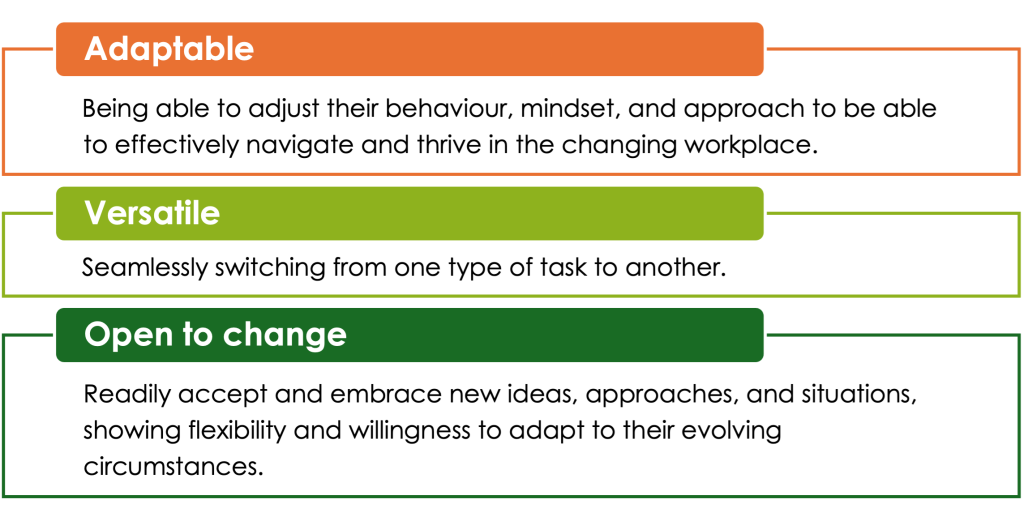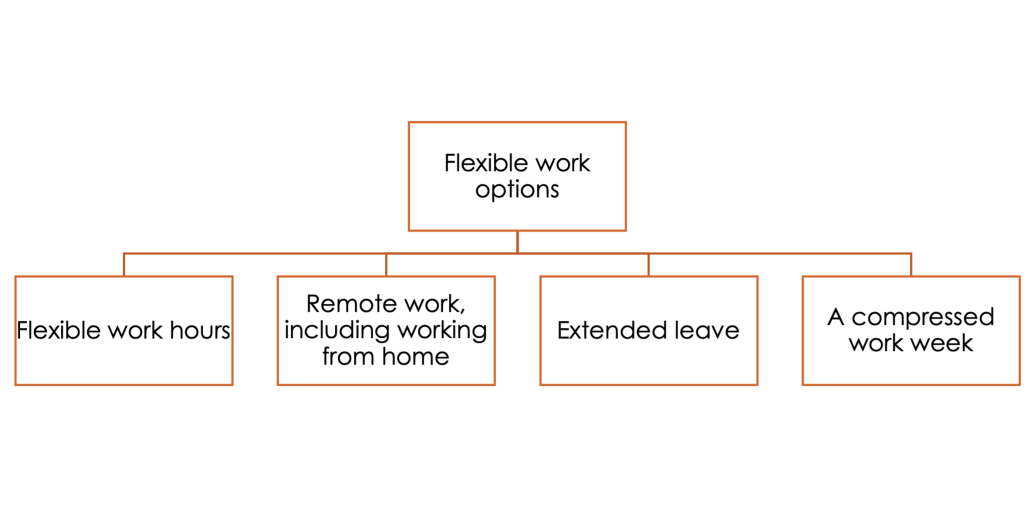By Carli Uys – Head of Marketing, Research and Development (MCom Industrial Psychology and MCom Communication studies)
What does it mean for you as employee to be flexible in the workplace?
According to Steve Hogarty, flexibility is a measure of how well you deal with the unexpected. A flexible employee is someone who is adaptable, able to adjust to changing circumstances and demands in the workplace, and can perform various tasks and responsibilities. This refers to how quickly you are able to adapt to new circumstances as they arise, and how you respond to these change events. Allowing flexible work options can increase employee’s ability to adapt and overcome unanticipated obstacles. This is important in all industries, but more so in fast-moving and dynamic industries, where employees have to respond to unpredictable events and changes in their industry.
For an employee to be flexible, they need to be:

How you can show that you are flexible:
- When a colleague is struggling to complete a task, or just has too many tasks to complete at once, offer your assistance with the task that you know you can do well and help to reduce their load.
- Do training courses, or ask someone who is proficient in new technology, to teach you how it works and what it can be used for so you can meet all the organisation’s demands.
- Know that there is always something that can emerge that requires your immediate attention, and can take you away from the work that you have planned for that day. You will then have to prioritise these emergencies over urgent tasks.
- Always be willing to listen to constructive feedback so you are able to meet your performance standards as required by the organisation.
- Be willing to, at times, work overtime to reach shared goals and deadlines.
To be able to truly become flexible in the workplace, you need to focus on the above and implement it on a daily basis to make sure you are ready to face any challenge or setback as they arise.
2023 Employee Experience Trends Report, indicated that employees have been working at ‘surge level’ for years. Employees are expected to go above and beyond for the organisation, and it is not viewed as an exception anymore, it is expectation now. This has led to employees having to reclaim their boundaries. Due to the global pandemic, global upheavals and commercial disruption, employees were expected to go above and beyond for the organisation, which led to working longer hours, and all hours of the day. Now employees are taking back control and reshaping their relationship with the organisation by setting boundaries that are healthy for them.
Employees are now requiring a more flexible work environment. If organisation implement workplace flexibility it will lead to better life-work balance, reduced stress, reducing absenteeism, reduced turnover rate of their employees. A flexible work environment boosts employee morale, satisfaction, and productivity
Flexibility – is the niche word everyone is looking for in their job. Yet most organisations don’t offer flexible work options. Flexible work options has the potential to uplift and level-up the well-being of employees.

Offering employees these various flexible work options afford them some great benefits. These employees can experience less stress and better mental health if they are afforded work flexibility.
Why it is important for organisation to implement a flexible work environment
- The new job entrants, Gen Z’s, have a flexible mindset. They require more opportunities to let their voice be heard, be able to have a flexible work arrangement, as they think and behave differently than the other generations.
- Organisations are more likely to retain their employees as they will feel that the organisation is trusting them to get their tasks done effectively, without having to be in the office or micromanaged. This in turn benefits the organisation as they get a high return on their investment.
- When an organisation allows employees enough time to deal with their personal obligations, they may be less distracted which can lead to higher productivity at work.
Being a flexible employee and having a flexible work environment, has numerous advantages for both employees and employers. Embracing flexibility can increase your productivity, knowledge base, skills, and help you to be noticed by leaders who can possibly promote you. Embracing a flexible work environment can transform an organisation’s business, creating a more productive and satisfied workforce, while reducing stress, absenteeism and enhance employee retention.